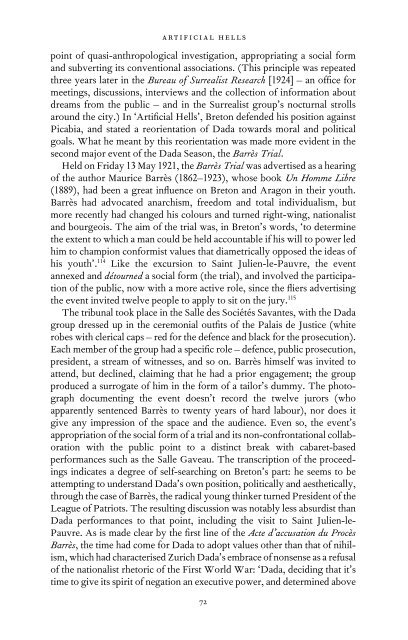Participatory Art and the Politics of Spectatorship - autonomous ...
Participatory Art and the Politics of Spectatorship - autonomous ...
Participatory Art and the Politics of Spectatorship - autonomous ...
You also want an ePaper? Increase the reach of your titles
YUMPU automatically turns print PDFs into web optimized ePapers that Google loves.
artificial hells<br />
point <strong>of</strong> quasi- anthropological investigation, appropriating a social form<br />
<strong>and</strong> subverting its conventional associations. (This principle was repeated<br />
three years later in <strong>the</strong> Bureau <strong>of</strong> Surrealist Research [1924] – an <strong>of</strong>fi ce for<br />
meetings, discussions, interviews <strong>and</strong> <strong>the</strong> collection <strong>of</strong> information about<br />
dreams from <strong>the</strong> public – <strong>and</strong> in <strong>the</strong> Surrealist group’s nocturnal strolls<br />
around <strong>the</strong> city.) In ‘<strong>Art</strong>ifi cial Hells’, Breton defended his position against<br />
Picabia, <strong>and</strong> stated a reorientation <strong>of</strong> Dada towards moral <strong>and</strong> political<br />
goals. What he meant by this reorientation was made more evident in <strong>the</strong><br />
second major event <strong>of</strong> <strong>the</strong> Dada Season, <strong>the</strong> Barrès Trial.<br />
Held on Friday 13 May 1921, <strong>the</strong> Barrès Trial was advertised as a hearing<br />
<strong>of</strong> <strong>the</strong> author Maurice Barrès (1862– 1923), whose book Un Homme Libre<br />
(1889), had been a great infl uence on Breton <strong>and</strong> Aragon in <strong>the</strong>ir youth.<br />
Barrès had advocated anarchism, freedom <strong>and</strong> total individualism, but<br />
more recently had changed his colours <strong>and</strong> turned right- wing, nationalist<br />
<strong>and</strong> bourgeois. The aim <strong>of</strong> <strong>the</strong> trial was, in Breton’s words, ‘to determine<br />
<strong>the</strong> extent to which a man could be held accountable if his will to power led<br />
him to champion conformist values that diametrically opposed <strong>the</strong> ideas <strong>of</strong><br />
his youth’. 114 Like <strong>the</strong> excursion to Saint Julien- le- Pauvre, <strong>the</strong> event<br />
annexed <strong>and</strong> détourned a social form (<strong>the</strong> trial), <strong>and</strong> involved <strong>the</strong> participation<br />
<strong>of</strong> <strong>the</strong> public, now with a more active role, since <strong>the</strong> fl iers advertising<br />
<strong>the</strong> event invited twelve people to apply to sit on <strong>the</strong> jury. 115<br />
The tribunal took place in <strong>the</strong> Salle des Sociétés Savantes, with <strong>the</strong> Dada<br />
group dressed up in <strong>the</strong> ceremonial outfi ts <strong>of</strong> <strong>the</strong> Palais de Justice (white<br />
robes with clerical caps – red for <strong>the</strong> defence <strong>and</strong> black for <strong>the</strong> prosecution).<br />
Each member <strong>of</strong> <strong>the</strong> group had a specifi c role – defence, public prosecution,<br />
president, a stream <strong>of</strong> witnesses, <strong>and</strong> so on. Barrès himself was invited to<br />
attend, but declined, claiming that he had a prior engagement; <strong>the</strong> group<br />
produced a surrogate <strong>of</strong> him in <strong>the</strong> form <strong>of</strong> a tailor’s dummy. The photograph<br />
documenting <strong>the</strong> event doesn’t record <strong>the</strong> twelve jurors (who<br />
apparently sentenced Barrès to twenty years <strong>of</strong> hard labour), nor does it<br />
give any impression <strong>of</strong> <strong>the</strong> space <strong>and</strong> <strong>the</strong> audience. Even so, <strong>the</strong> event’s<br />
appropriation <strong>of</strong> <strong>the</strong> social form <strong>of</strong> a trial <strong>and</strong> its non- confrontational collaboration<br />
with <strong>the</strong> public point to a distinct break with cabaret- based<br />
performances such as <strong>the</strong> Salle Gaveau. The transcription <strong>of</strong> <strong>the</strong> proceedings<br />
indicates a degree <strong>of</strong> self- searching on Breton’s part: he seems to be<br />
attempting to underst<strong>and</strong> Dada’s own position, politically <strong>and</strong> aes<strong>the</strong>tically,<br />
through <strong>the</strong> case <strong>of</strong> Barrès, <strong>the</strong> radical young thinker turned President <strong>of</strong> <strong>the</strong><br />
League <strong>of</strong> Patriots. The resulting discussion was notably less absurdist than<br />
Dada performances to that point, including <strong>the</strong> visit to Saint Julien- le-<br />
Pauvre. As is made clear by <strong>the</strong> fi rst line <strong>of</strong> <strong>the</strong> Acte d’accusation du Procès<br />
Barrès, <strong>the</strong> time had come for Dada to adopt values o<strong>the</strong>r than that <strong>of</strong> nihilism,<br />
which had characterised Zurich Dada’s embrace <strong>of</strong> nonsense as a refusal<br />
<strong>of</strong> <strong>the</strong> nationalist rhetoric <strong>of</strong> <strong>the</strong> First World War: ‘Dada, deciding that it’s<br />
time to give its spirit <strong>of</strong> negation an executive power, <strong>and</strong> determined above<br />
72
















